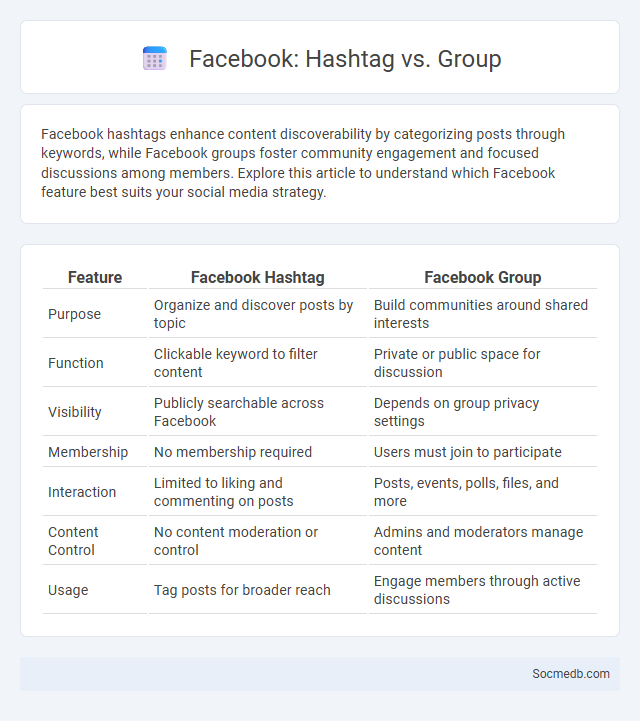
Photo illustration: Facebook Hashtag vs Group
Facebook hashtags enhance content discoverability by categorizing posts through keywords, while Facebook groups foster community engagement and focused discussions among members. Explore this article to understand which Facebook feature best suits your social media strategy.
Table of Comparison
| Feature | Facebook Hashtag | Facebook Group |
|---|---|---|
| Purpose | Organize and discover posts by topic | Build communities around shared interests |
| Function | Clickable keyword to filter content | Private or public space for discussion |
| Visibility | Publicly searchable across Facebook | Depends on group privacy settings |
| Membership | No membership required | Users must join to participate |
| Interaction | Limited to liking and commenting on posts | Posts, events, polls, files, and more |
| Content Control | No content moderation or control | Admins and moderators manage content |
| Usage | Tag posts for broader reach | Engage members through active discussions |
Introduction to Facebook Engagement Tools
Facebook engagement tools include features like reactions, comments, shares, and polls designed to boost user interaction and brand visibility. These tools enable businesses and content creators to measure audience response, improve content strategy, and foster community growth. Utilizing insights from Facebook Analytics helps optimize posts for higher engagement rates and targeted reach.
What Are Facebook Hashtags?
Facebook hashtags are clickable keywords or phrases preceded by the pound symbol (#) that organize content and make it easily discoverable by users interested in specific topics. Your use of relevant hashtags on Facebook posts can increase visibility, engagement, and reach by connecting your content to trending conversations and niche communities. Incorporating popular and targeted Facebook hashtags strategically enhances the chances of attracting your desired audience and growing your online presence.
Understanding Facebook Groups
Facebook Groups serve as dynamic online communities where members with shared interests collaborate, exchange ideas, and foster meaningful connections. These groups offer customizable privacy settings--public, closed, or secret--allowing users to control visibility and membership access, which enhances targeted engagement. Administrators wield tools to moderate content effectively, promote group objectives, and analyze member interactions through insights for optimized community growth.
Key Features of Facebook Hashtags
Facebook hashtags enable users to categorize content and enhance discoverability by linking posts with similar themes or topics. They support trending topics and enhance user engagement by increasing post visibility in search results and news feeds. Hashtags on Facebook allow targeted audience reach, making them essential for campaigns, event promotions, and community building.
Key Features of Facebook Groups
Facebook Groups offer focused community engagement through features like customizable privacy settings, enabling public, closed, or secret group options to suit diverse interaction needs. Members benefit from tools such as post moderation, event scheduling, and file sharing to foster collaboration and maintain group quality. Integration with Facebook's algorithms enhances content visibility within groups, increasing member participation and facilitating targeted communication.
Pros and Cons of Using Hashtags on Facebook
Hashtags on Facebook enhance content discoverability by categorizing posts, increasing your reach to targeted audiences interested in specific topics. However, excessive or irrelevant hashtag use can reduce engagement, making posts appear spammy and lowering their visibility in Facebook's algorithm. Carefully selecting relevant hashtags aligns your content with user interests, boosting interaction without overwhelming your followers.
Pros and Cons of Using Facebook Groups
Facebook Groups foster community engagement by enabling users to connect over shared interests and facilitate peer support, which enhances collaboration and information exchange. However, they can also become echo chambers that reinforce biases and sometimes propagate misinformation, affecting the quality of discourse and user experience. Privacy concerns arise as group data might be accessed or misused, making it essential for users to manage settings carefully.
Facebook Hashtag vs Group: Core Differences
Facebook hashtags categorize content, making it easier for users to discover posts related to specific topics through search or trending tags. In contrast, Facebook Groups create dedicated communities where members can interact, share ideas, and engage in discussions around common interests or goals. Understanding the core differences helps you choose between boosting content visibility with hashtags or building a tight-knit audience within groups.
Best Practices for Leveraging Hashtags and Groups
Maximize your social media impact by strategically using hashtags relevant to your niche, boosting visibility and engagement within targeted communities. Participate actively in groups related to your industry to build authentic connections, share valuable content, and establish your authority. Consistently monitor hashtag performance and group interactions to refine your approach and increase follower growth effectively.
Choosing Between Facebook Hashtags and Groups for Your Strategy
Choosing between Facebook hashtags and groups for your social media strategy depends on your goals and target audience engagement. Hashtags can increase content discoverability and reach a broader audience, while groups foster community building and direct interaction with members sharing common interests. Your choice should align with whether you prioritize expanding visibility or cultivating deeper connections within a niche community.
 socmedb.com
socmedb.com